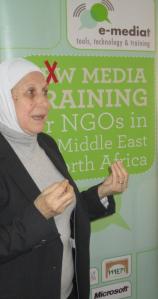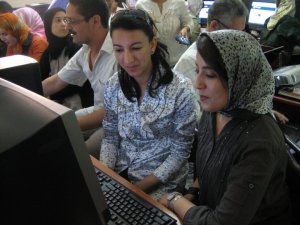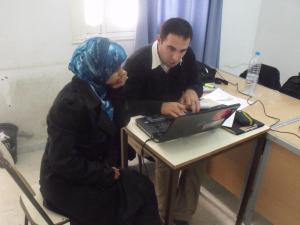As 2011 draws to a close, E-Mediat teams in Lebanon, Morocco and Tunisia reflect back at the trainings and experiences that made this year so special!
Nada Hamzeh, E-Mediat Country Director, Lebanon
Five basic workshops and more than three additional workshops connected us with over 50 organizations in Lebanon and the trainings were instrumental in introducing them to the strategy of using social media. We started our work by changing the commonly views about networking, social communication and outreach strategy among local organizations.
Time was shorter than the content but we accepted the challenge because we realized that the need for this training was much larger than our challenges. Our first achievement was deleting the word “new” from the New Media Training. We believe that social media has become an essential need for organizations and not just another option; social media is the core of any organizations mainstream communications strategy rather than an auxiliary medium. We are glad that during the past year the E-Mediat trainings inspired many organizations to experiment with participatory communication approach and led to some impressive changes on the ground.
- SSBA Lebanon shifted from a decision of a complete online absence to a strategic online presence.
- IPW has through the use of social media strategy realized some important freedoms for local women. IPW’s efforts have been instrumental in pushing legal reforms that allow mothers to open bank accounts for their children and travel with their children without permission from the fathers.
- The new Plan of Electricity went from being a citizens’ demand to a government approved plan after Omar Lababidi created a Facebook group with more than 3,500 people in less than a week to claim the adoption of the plan.
- Today, more NGOs, activists and political figures are supporting Kafa in their campaign of protecting women against domestic violence. Kafa’s efforts have resulted in Parliament discussing drafts of laws for protecting women’s rights.
- Adyan was the first organization to show it’s commitment for social media by recruiting a full time social media officer.
My participation in The Arab Women Summit focused on “Empowering Women through ICT” was the grand finale of the year. The opportunity allowed me to share the experience of E-Mediat trainings and address the fear prevalent among Arab women about using social media.
Widad EL HANAFI, E-Mediat Country Director, Morocco
We started the implementation of the E-Mediat Morocco program during the summer and literally had a fiery start. Our 1st workshop was in June and it was really hot this year. In Meknes it was so hot that our Hotel garden went on fire. It was nice to see Hotel staff and guests working together as a team to extinguish the fire before the arrival of firemen unit. Luckily no one got hurt and we were able to deliver our training despite the heat.
During the first workshop the NGOs were eager yet somewhat skeptical about the impact of social media tools. Yet our enthusiasm for delivering the trainings remained undiminished. During the 2nd workshop, E-Mediat Morocco team experienced an unfortunate incident when we ended up having a 19 hour road trip instead of 1 hour flight because of a misinformation by an employee at the airport. We arrived a bit late but the NGOs were waiting for us. NGOs interactivity during the workshops made us forget the nightmare we had experienced!
Through the remaining three workshops and several supplemental trainings, the NGOs have demonstrated unparallel enthusiasm for learning and implementing social media tools. On December 22nd, 2011, E-Mediat Morocco and 6 participating NGOs were invited to participate in Maa Chabab, a live National radio program focusing on youth, to discuss the role of social media in empowering NGOs. NGOs shared their experience with and achievements through social media tools. I was so amazed to observe that within 7 months these NGOs have equipped themselves with social media tools not only to empower and promote their NGOs but also to sustain and participate in the process of development within their communities.
- The AMADEP association in Ein leuh in the region of Azrou is using tools of social media in order to contribute to local management of their village. The Association has used a Facebook Page to bring local NGOs together and have now decided to form a regional consortium.
- Association of Youth without Borders (AJSF) along with other actors and NGOs has launched a campaign under the slogan: Participation is a National Duty. This campaign has focused on the importance of participation and the effectiveness of proper choice in the legislative elections of November, 2011.
It was a great experience to work with these NGOs and help them design their Social Media strategies and I look forward to 2012 with more synergy between NGOs and different actors for better networked and sustainable NGOs.
Chéma Gargouri, E-Mediat Country Director, Tunisia
In March 2011 the E-Mediat team launched the program’s activities just a few months after Tunisia’ s revolution on January 14, 2011. Since then, sixty NGOs (in the North, Center and South of Tunisia) have been intensively participating in training activities aimed at giving them the tools to better serve their communities in such a very sensitive time of Tunisia’s history: more poverty, more unemployment, more insecurity but more engaged individuals willing to participate in this phase of transition towards democracy.
The strategic use of social media, which is the focus of the program as a whole, was introduced and then over the life of the program started to become a practice used by the NGOs in conveying their message, mobilizing public opinion and in accomplishing their advocacy work. The program has introduced a new culture of openness and connectedness of these organizations to their environment converting them from closed to more accessible NGOs that are looking for the participation and engagement of their communities and beyond. In addition the program has allowed for development of partnerships between the participating organizations which is also one of the project’s objectives. As an example the network formed by the NGOs in Sfax, south of Tunis, to create a lobby of NGOs which main goal is to convert the RCD (former regime main political party) Sfax headquarters (that was burned during the revolution) into the “House of NGOs” of Sfax. An agreement was signed between all the NGOs as an official network and an online (using the tools they have learned during the program)-offline campaign will start after that in order to “force” the government to agree to give them the building. Thus a live and digital “friendship” has been installed which can also be illustrated by the example of one NGO, ACGenration, that is currently hosting AAO Sfax and Friends of Thyna in its office.
Another accomplishment that may be highlighted is the Association of Journalists’ success story: “A family without a roof”’; the video that changed the life of a poor family in Kairouan.
So beyond the technical side of the project that is allowing the NGOs to better master social media tools, the E-Mediat program is also allowing them to achieve tangible results that have an immediate impact on people’s life in particular and the country’s stability in general.



